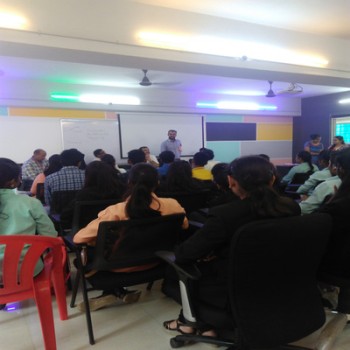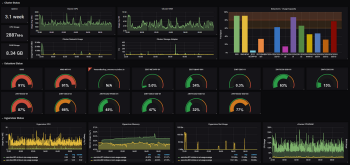
Revision: 7th-JAN-2020
- Part # 1 – Howto Save Mikrotik/Cisco Logs to Remote SYSLOG Server
- Part # 2 – Centralized Syslog-ng logging to MySql DB
- Part # 3 Minimized logging to mysql with dynamic tables & trimming >> You are here
In continuation to existing posts related to syslog-ng, Following post illustrates on how you can log only particular messages with pattern matching and let syslog-ng creates dynamic table based on the dates so that searching/querying becomes easy.
This task was required in relation to CGNAT logging. you may want to read it here
Hardware Software used in this post:
- Mikrotik Routerboard – firmware 6.46.x
- Ubuntu 16.4 Server x64 along with syslog-ng version 3.25.1 on some decent hardware
Requirements:
Ubuntu OS
Ref: Installing latest version of syslog-ng
#Make sure to change the version, I have used this CMD on Ubuntu 16.04 , for version 18, you may change this to 18.04
wget -qO - http://download.opensuse.org/repositories/home:/laszlo_budai:/syslog-ng/xUbuntu_16.04/Release.key | sudo apt-key add -touch /etc/apt/sources.list.d/syslog-ng-obs.listecho "deb http://download.opensuse.org/repositories/home:/laszlo_budai:/syslog-ng/xUbuntu_16.04 ./" > /etc/apt/sources.list.d/syslog-ng-obs.listapt-get updateapt-get -y install apache2 mc wget make gcc mysql-server mysql-client curl phpmyadmin libdbd-pgsql aptitude libboost-system-dev libboost-thread-dev libboost-regex-dev libmongo-client0 libesmtp6 syslog-ng-mod-sql libdbd-mysql libdbd-mysql syslog-ngNote: during above packages installation, it will ask you to enter mysql/phpmyadmin password, you can use your root password to continue the installations. It may download around after installation finishes, you can check syslog-ng version.
At the time I did installation I got this
syslog-ng -V
root@nab-syslog:~# syslog-ng -Vsyslog-ng 3 (3.30.1)Config version: 3.29Installer-Version: 3.30.1Revision: 3.30.1-2Compile-Date: Nov 19 2020 16:33:22Module-Directory: /usr/lib/syslog-ng/3.30Module-Path: /usr/lib/syslog-ng/3.30Include-Path: /usr/share/syslog-ng/includeError opening plugin module; module='mod-java', error='libjvm.so: cannot open shared object file: No such file or directory'Available-Modules: syslogformat,azure-auth-header,hook-commands,linux-kmsg-format,kafka,afmongodb,json-plugin,cef,secure-logging,afsocket,pseudofile,kvformat,add-contextual-data,afamqp,riemann,http,appmodel,stardate,tfgetent,redis,cryptofuncs,sdjournal,afuser,pacctformat,graphite,confgen,geoip2-plugin,affile,basicfuncs,xml,mod-python,examples,afsmtp,timestamp,map-value-pairs,disk-buffer,afsnmp,system-source,afsql,afstomp,csvparser,tags-parser,afprog,dbparserEnable-Debug: offEnable-GProf: offEnable-Memtrace: offEnable-IPv6: onEnable-Spoof-Source: onEnable-TCP-Wrapper: onEnable-Linux-Caps: onEnable-Systemd: onStatus:
root@nab-syslog:~# service syslog-ng statussyslog-ng.service - System Logger DaemonLoaded: loaded (/lib/systemd/system/syslog-ng.service; enabled; vendor preset: enabled)Active: active (running) since Mon 2021-01-25 00:20:55 EST; 1min 26s agoDocs: man:syslog-ng(8)Main PID: 21596 (syslog-ng)CGroup: /system.slice/syslog-ng.service21596 /usr/sbin/syslog-ng -FJan 25 00:20:55 nab-syslog systemd[1]: Starting System Logger Daemon...Jan 25 00:20:55 nab-syslog systemd[1]: Started System Logger Daemon.Create Database in mySQL to store dynamic tables
Create Base Database for storing dynamically created date wise tables
mysql -uroot -pXXX -e "create database syslog;"Now edit the syslog-ng file
nano /etc/syslog-ng/syslog-ng.conf& use following as sample. I would recommend that you should add only relevant part, just dont do blind copy paste. This is just sample for demonstration purposes only …
Syslog-ng Sample File
@version: 3.30@include "scl.conf"# First, set some global options.options { chain_hostnames(off); flush_lines(0); use_dns(no); use_fqdn(no);dns_cache(no); owner("root"); group("adm"); perm(0640);stats_freq(0); bad_hostname("^gconfd$");};######################### Sources######################### This is the default behavior of sysklogd package# Logs may come from unix stream, but not from another machine.#source s_src {system();internal();};######################### Destinations######################### First some standard logfile#destination d_auth { file("/var/log/auth.log"); };destination d_cron { file("/var/log/cron.log"); };destination d_daemon { file("/var/log/daemon.log"); };destination d_kern { file("/var/log/kern.log"); };destination d_lpr { file("/var/log/lpr.log"); };destination d_mail { file("/var/log/mail.log"); };destination d_syslog { file("/var/log/syslog"); };destination d_user { file("/var/log/user.log"); };destination d_uucp { file("/var/log/uucp.log"); };destination d_mailinfo { file("/var/log/mail.info"); };destination d_mailwarn { file("/var/log/mail.warn"); };destination d_mailerr { file("/var/log/mail.err"); };destination d_newscrit { file("/var/log/news/news.crit"); };destination d_newserr { file("/var/log/news/news.err"); };destination d_newsnotice { file("/var/log/news/news.notice"); };destination d_debug { file("/var/log/debug"); };destination d_error { file("/var/log/error"); };destination d_messages { file("/var/log/messages"); };destination d_console { usertty("root"); };destination d_console_all { file(`tty10`); };destination d_xconsole { pipe("/dev/xconsole"); };destination d_ppp { file("/var/log/ppp.log"); };######################### Filters######################### Here's come the filter options. With this rules, we can set which# message go where.filter f_dbg { level(debug); };filter f_info { level(info); };filter f_notice { level(notice); };filter f_warn { level(warn); };filter f_err { level(err); };filter f_crit { level(crit .. emerg); };filter f_debug { level(debug) and not facility(auth, authpriv, news, mail); };filter f_error { level(err .. emerg) ; };filter f_messages { level(info,notice,warn) andnot facility(auth,authpriv,cron,daemon,mail,news); };filter f_auth { facility(auth, authpriv) and not filter(f_debug); };filter f_cron { facility(cron) and not filter(f_debug); };filter f_daemon { facility(daemon) and not filter(f_debug); };filter f_kern { facility(kern) and not filter(f_debug); };filter f_lpr { facility(lpr) and not filter(f_debug); };filter f_local { facility(local0, local1, local3, local4, local5,local6, local7) and not filter(f_debug); };filter f_mail { facility(mail) and not filter(f_debug); };filter f_news { facility(news) and not filter(f_debug); };filter f_syslog3 { not facility(auth, authpriv, mail) and not filter(f_debug); };filter f_user { facility(user) and not filter(f_debug); };filter f_uucp { facility(uucp) and not filter(f_debug); };filter f_cnews { level(notice, err, crit) and facility(news); };filter f_cother { level(debug, info, notice, warn) or facility(daemon, mail); };filter f_ppp { facility(local2) and not filter(f_debug); };filter f_console { level(warn .. emerg); };######################### Log paths########################log { source(s_src); filter(f_auth); destination(d_auth); };log { source(s_src); filter(f_cron); destination(d_cron); };log { source(s_src); filter(f_daemon); destination(d_daemon); };log { source(s_src); filter(f_kern); destination(d_kern); };log { source(s_src); filter(f_lpr); destination(d_lpr); };log { source(s_src); filter(f_syslog3); destination(d_syslog); };log { source(s_src); filter(f_user); destination(d_user); };log { source(s_src); filter(f_uucp); destination(d_uucp); };log { source(s_src); filter(f_mail); destination(d_mail); };log { source(s_src); filter(f_news); filter(f_crit); destination(d_newscrit); };log { source(s_src); filter(f_news); filter(f_err); destination(d_newserr); };log { source(s_src); filter(f_news); filter(f_notice); destination(d_newsnotice); };log { source(s_src); filter(f_debug); destination(d_debug); };log { source(s_src); filter(f_error); destination(d_error); };log { source(s_src); filter(f_messages); destination(d_messages); };log { source(s_src); filter(f_console); destination(d_console_all);destination(d_xconsole); };log { source(s_src); filter(f_crit); destination(d_console); };@include "/etc/syslog-ng/conf.d/*.conf"######## Zaib Section Starts here# Accept connection on UDPsource s_net { udp (); };# Adding filter for our Mikrotik Routerboard, store logs in FILE as primary# MIKROTIK ############ This entry will LOG all information coming from this IP, change this to match your mikrotik NASfilter f_mikrotik_192.168.0.1 { host("192.168.0.1"); };# add info in LOG (Part1)destination df_mikrotik_192.168.0.1 {file("/var/log/zlogs/${HOST}.${YEAR}.${MONTH}.${DAY}.log"template-escape(no));};source s_mysql {udp(port(514));tcp(port(514));};# Store Logs in MYSQL DB as secondary # add info in MYSQL (Part2)destination d_mysql {sql(type(mysql)host("localhost")# MAKE SURE TO CHANGE CREDENTIALSusername("root")password("XXXXX")database("syslog")table("${R_YEAR}_${R_MONTH}_${R_DAY}")columns( "id int(11) unsigned not null auto_increment primary key", "host varchar(40) not null", "date datetime", "message text not null")values("0", "$FULLHOST", "$R_YEAR-$R_MONTH-$R_DAY $R_HOUR:$R_MIN:$R_SEC", "$MSG")indexes("id"));};log {source(s_net);filter(f_mikrotik_192.168.0.1);destination(d_mysql);};IMPORTANT:
Create ‘zlogs‘ folder in /var/log , so that mikrotik logs will be saved in separate file if required by you
mkdir /var/log/zlogs
Mikrotik rule to LOG Forward chain
Now we need to create a rule in mikrotik FILTER section so that it can log all packets being forward to/from pppoe users. Make sure you in source address list you select your local pppoe users pool there to avoid un-related excessive logging. In below example we are doing only TCP base connection for NEW tcp connections only.
LOG SIZE Example: at one ISP who had around 1200+ online users , its log size for TCP connection was around 25 GB. to lower the size, I configured it log only new TCP connections which reduced the DB Size by 50%.
/ip firewall filteradd action=log chain=forward connection-state=new protocol=tcp src-address-list=pppoe_allowed_usersMikrotik rule to send LOG to SYSLOG-NG Server
/system logging actionadd name=syslogng remote=192.168.101.1 target=remote# Change IP address pointed towards syslog server/system loggingset 0 topics=info,!firewalladd action=syslogng topics=firewall
Restart Syslog-ng server
Now restart syslog-ng service
service syslog-ng restartand you will see the dynamic tables created as follows
mysql -uroot -pXXXXXmysql: [Warning] Using a password on the command line interface can be insecure.Welcome to the MySQL monitor. Commands end with ; or \g.Your MySQL connection id is 411Server version: 5.7.28-0ubuntu0.18.04.4-log (Ubuntu)Copyright (c) 2000, 2019, Oracle and/or its affiliates. All rights reserved.Oracle is a registered trademark of Oracle Corporation and/or itsaffiliates. Other names may be trademarks of their respectiveowners.Type 'help;' or '\h' for help. Type '\c' to clear the current input statement.mysql> use syslog;Reading table information for completion of table and column namesYou can turn off this feature to get a quicker startup with -ADatabase changedmysql> show tables;+------------------+| Tables_in_syslog |+------------------+| 2020_01_08 |+------------------+1 row in set (0.00 sec)mysql> describe 2020_01_08;+---------+------------------+------+-----+---------+----------------+| Field | Type | Null | Key | Default | Extra |+---------+------------------+------+-----+---------+----------------+| id | int(11) unsigned | NO | PRI | NULL | auto_increment || host | varchar(40) | NO | | NULL | || date | datetime | YES | | NULL | || message | text | NO | | NULL | |+---------+------------------+------+-----+---------+----------------+4 rows in set (0.00 sec)& you can then see data insertion into the table as soon LOG is received from remote devices
2020-01-08T07:49:43.020811Z 430 Query INSERT INTO 2020_01_08 (id, host, date, message) VALUES ('0', '101.11.11.252', '2020-01-08 12:49:28', 'forward: in: out:ether1-agp-wan, src-mac d0:bf:9c:f7:88:76, proto TCP (ACK,PSH), 172.16.0.2:57193->172.217.19.174:443, NAT (172.16.0.2:57193->101.11.11.252:2244)->172.217.19.174:443, len 79')2020-01-08T07:49:43.031281Z 430 Query INSERT INTO 2020_01_08 (id, host, date, message) VALUES ('0', '101.11.11.252', '2020-01-08 12:49:28', 'forward: in: out:ether1-agp-wan, src-mac d0:bf:9c:f7:88:76, proto TCP (ACK,FIN), 172.16.0.2:57096->3.228.94.102:443, NAT (172.16.0.2:57096->101.11.11.252:2219)->3.228.94.102:443, len 40')2020-01-08T07:49:43.041420Z 430 Query INSERT INTO 2020_01_08 (id, host, date, message) VALUES ('0', '101.11.11.252', '2020-01-08 12:49:38', 'forward: in: out:ether1-agp-wan, src-mac d0:bf:9c:f7:88:76, proto UDP, 172.16.0.2:49247->216.58.208.234:443, NAT (172.16.0.2:49247->101.11.11.252:2202)->216.58.208.234:443, len 1378')2020-01-08T07:49:43.051112Z 430 Query INSERT INTO 2020_01_08 (id, host, date, message) VALUES ('0', '101.11.11.252', '2020-01-08 12:49:38', 'forward: in: out:ether1-agp-wan, src-mac d0:bf:9c:f7:88:76, proto UDP, 172.16.0.2:49247->216.58.208.234:443, NAT (172.16.0.2:49247->101.11.11.252:2202)->216.58.208.234:443, len 1378')2020-01-08T07:49:43.061280Z 430 Query INSERT INTO 2020_01_08 (id, host, date, message) VALUES ('0', '101.11.11.252', '2020-01-08 12:49:39', 'forward: in: out:ether1-agp-wan, src-mac d0:bf:9c:f7:88:76, proto UDP, 172.16.0.2:49760->172.217.19.1:443, NAT (172.16.0.2:49760->101.11.11.252:2202)->172.217.19.1:443, len 1378')2020-01-08T07:49:43.071449Z 430 Query INSERT INTO 2020_01_08 (id, host, date, message) VALUES ('0', '101.11.11.252', '2020-01-08 12:49:39', 'forward: in: out:ether1-agp-wan, src-mac d0:bf:9c:f7:88:76, proto UDP, 172.16.0.2:49760->172.217.19.1:443, NAT (172.16.0.2:49760->101.11.11.252:2202)->172.217.19.1:443, len 1378')2020-01-08T07:49:44.828993Z 430 Query INSERT INTO 2020_01_08 (id, host, date, message) VALUES ('0', '101.11.11.252', '2020-01-08 12:49:44', 'forward: in: out:ether1-agp-wan, src-mac d0:bf:9c:f7:88:76, proto UDP, 172.16.0.2:53503->216.58.208.234:443, NAT (172.16.0.2:53503->101.11.11.252:2203)->216.58.208.234:443, len 827')2020-01-08T07:49:44.851034Z 430 Query INSERT INTO 2020_01_08 (id, host, date, message) VALUES ('0', '101.11.11.252', '2020-01-08 12:49:44', 'forward: in: out:ether1-agp-wan, src-mac d0:bf:9c:f7:88:76, proto UDP, 172.16.0.2:53503->216.58.208.234:443, NAT (172.16.0.2:53503->101.11.11.252:2203)->216.58.208.234:443, len 827')2020-01-08T07:51:37.518276Z 430 Query INSERT INTO 2020_01_08 (id, host, date, message) VALUES ('0', '101.11.11.252', '2020-01-08 12:51:37', 'forward: in: out:ether1-agp-wan, src-mac d0:bf:9c:f7:88:76, proto TCP (ACK), 172.16.0.2:57202->91.195.240.126:80, NAT (172.16.0.2:57202->101.11.11.252:2260)->91.195.240.126:80, len 41')2020-01-08T07:51:37.522015Z 430 Query INSERT INTO 2020_01_08 (id, host, date, message) VALUES ('0', '101.11.11.252', '2020-01-08 12:51:37', 'forward: in: out:ether1-agp-wan, src-mac d0:bf:9c:f7:88:76, proto TCP (ACK), 172.16.0.2:57202->91.195.240.126:80, NAT (172.16.0.2:57202->101.11.11.252:2260)->91.195.240.126:80, len 41')
TIPS
Deleting all tables inside particular DB
#!/bin/bash# drop tables matching filterforce=1;u=root;p=SQLPASS;db=syslog;filter=users_;for t in $(mysql -u $u -p$p -D $db -Bse 'show tables' | grep $filter); doecho Dropping $t;[[ $force -eq 1 ]] && mysql -u root -p$p -D $db -Bse "drop table \`$t\`"done








